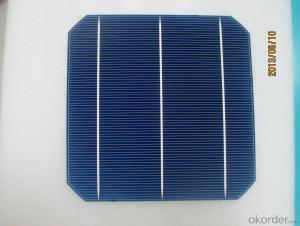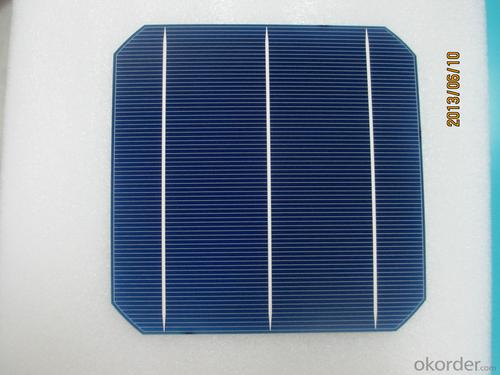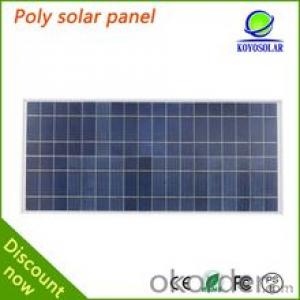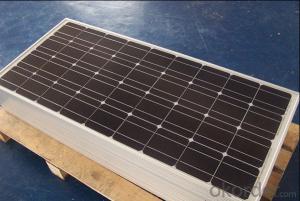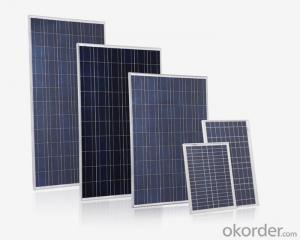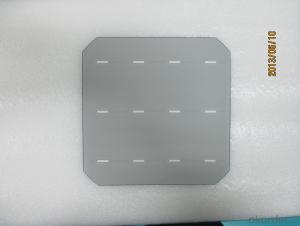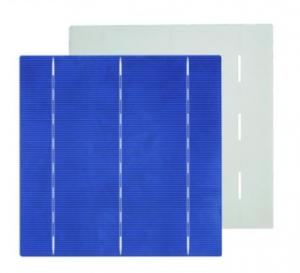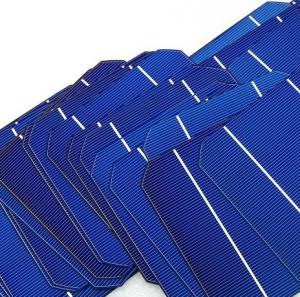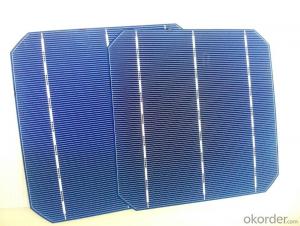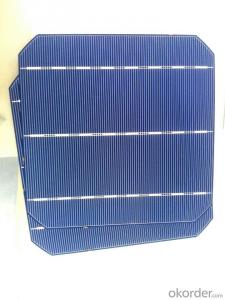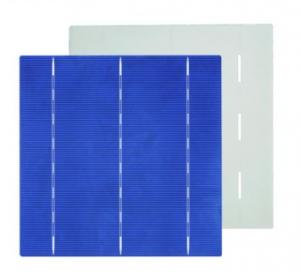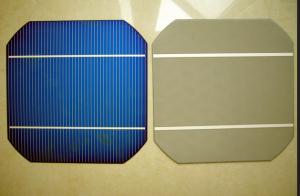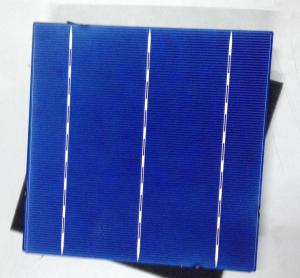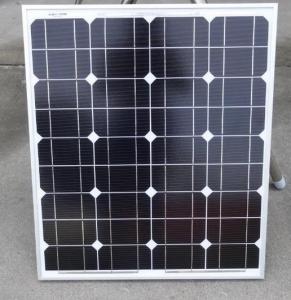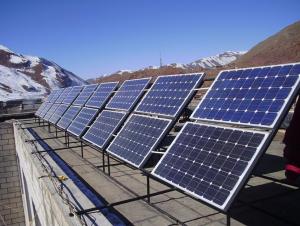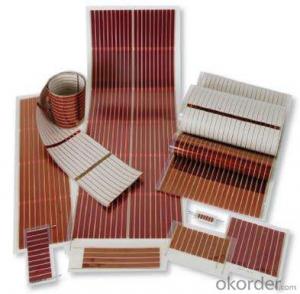Night-Active Monocrystal Solar Energy Cell 156*156mm with 18.8% Efficiency
- Loading Port:
- China Main Port
- Payment Terms:
- TT or LC
- Min Order Qty:
- -
- Supply Capability:
- 1000000 pc/month
OKorder Service Pledge
OKorder Financial Service
You Might Also Like
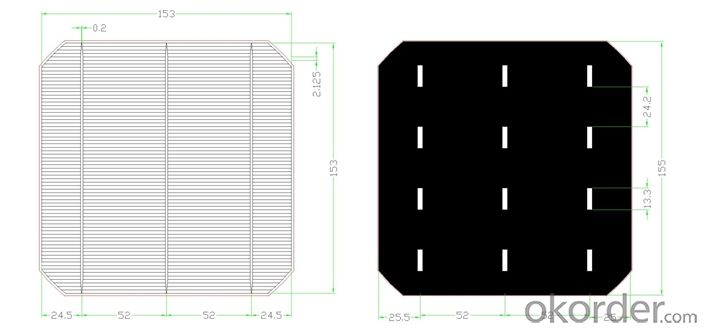
Monocrystal Solar Energy Cell
type:156M
appearance:156×1565㎜±0.5mm;diagonal:R=100mm
Main fence wide:1.4-1.5mm back electrode wide:2-2.5mm
Fence line qty:90
Cell thickness:220um±20um
Eff(%) | 18.00- 18.10 | 18.10- 18.20 | 18.20- 18.30 | 18.30- 18.40 | 18.40- 18.50 | 18.50- 18.60 | 18.60- 18.70 | 18.70- 18.80 | 18.80- 18.90 | 18.9- 19.0 | 19.1- 19.1 | 19.1- 19.2 |
Pm(W) | 4.30 | 4.33 | 4.35 | 4.37 | 4.40 | 4.42 | 4.44 | 4.47 | 4.49 | 4.52 | 4.54 | 4.56 |
Isc(A) | 8.71 | 8.73 | 8.76 | 8.77 | 8.78 | 8.82 | 8.83 | 8.85 | 8.86 | 8.88 | 8.9 | 8.93 |
Im(A) | 8.19 | 8.21 | 8.24 | 8.26 | 8.30 | 8.33 | 8.35 | 8.39 | 8.42 | 8.45 | 8.47 | 8.51 |
Voc(V) | 0.630 | 0.631 | 0.632 | 0.633 | 0.634 | 0.634 | 0.635 | 0.636 | 0.637 | 0.637 | 0.638 | 0.64 |
Vm(V) | 0.527 | 0.528 | 0.529 | 0.531 | 0.531 | 0.532 | 0.534 | 0.534 | 0.535 | 0.536 | 0.537 | 0.538 |
FF(%) | 78.6 | 78.7 | 78.8 | 79.0 | 79.2 | 79.3 | 79.5 | 79.6 | 79.8 | 80 | 80 | 80 |

remark:our company cells as per working current concentrate principle,separate the first and the second grade
Packaging & Delivery of Polycrystalline Solar Cells
Carton Box Package and Deliver by air. It should be noticed that it should be avoid of water, sunshine and moist.
Factory Picture of Solar Cells
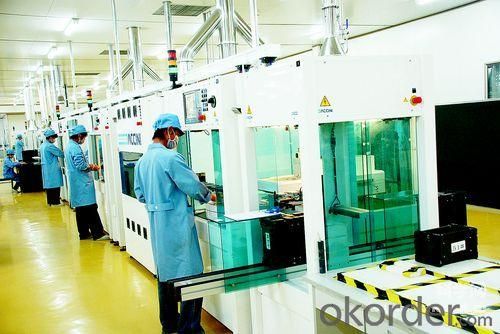
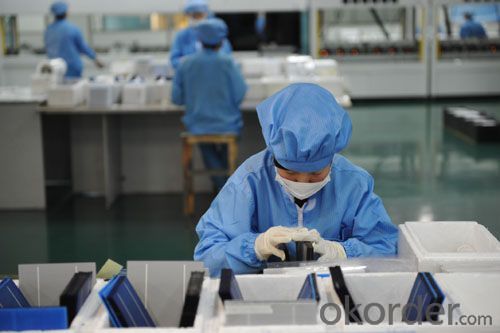
FAQ
We have organized several common questions for our clients,may help you sincerely:
What’s price per watt?
A: It’s depends on the quantity, delivery date and payment terms of the order. We can talk further about the detail price issue. Our products is high quality with lower price level.
Can you tell me the parameter of your solar cells?
We have different series of cells with different power output, both from c-si to a-si. Please take our specification sheet for your reference.
How do you pack your products?
We have rich experience on how to pack the panels to make sure the safety on shipment when it arrives at the destination.
Can you do OEM for us?
Yes, we can.
How long can we receive the product after purchase?
In the purchase of product within three working days, We will arrange the factory delivery as soon as possible. The perfect time of receiving is related to the state and position of customers. Commonly 7 to 10 working days can be served.
- Q: Can solar cells be used on curved surfaces?
- Yes, solar cells can be used on curved surfaces. Advances in technology have enabled the development of flexible and bendable solar panels that can conform to curved or irregular shapes, allowing for their installation on various surfaces such as rooftops, vehicles, and even clothing.
- Q: How much energy can a solar cell generate?
- The amount of energy a solar cell can generate depends on various factors such as its size, efficiency, and the amount of sunlight it receives. On average, a solar cell can generate anywhere from a few watts to several hundred watts of power.
- Q: What kind of products can be considered as the solar cell products?
- Many products are actually solar cell product, such as solar air conditioning, solar balloon, solar charger, solar dryer, solar cooker, etc.
- Q: Can solar cells be damaged by hail or other weather conditions?
- Yes, solar cells can be damaged by hail or other severe weather conditions. Hail can cause physical damage to the surface of solar cells, such as cracks or breakage, which can reduce their efficiency or render them completely non-functional. Additionally, extreme weather conditions like hurricanes or strong winds can also dislodge or damage solar panels, impacting their performance. Therefore, it is essential to consider the durability and resilience of solar panels when installing them in areas prone to severe weather.
- Q: How to get high voltage, high current output of solar cells
- Using 880 0.5 volt 5 amp output of the panel, 440 in series as the first group, and then get a second group, then the two groups in parallel, you can get 220 volts 10 amps output
- Q: Can solar cells be used on road surfaces?
- Yes, solar cells can be used on road surfaces. Solar road technology, also known as solar roadways, involves embedding solar panels into roadways to generate electricity. These solar panels are designed to withstand the weight of vehicles and can be used to power streetlights, traffic signals, and even electric vehicles. However, there are challenges to overcome, such as durability and cost-effectiveness, before widespread implementation can occur.
- Q: Can solar cells be used for desalination purposes?
- Yes, solar cells can be used for desalination purposes. Solar-powered desalination systems, such as reverse osmosis (RO) or solar stills, can convert saltwater into freshwater by utilizing the energy from sunlight to power the desalination process. This renewable energy source makes desalination more sustainable and environmentally friendly.
- Q: Can solar cells be used for powering shopping malls?
- Yes, solar cells can be used for powering shopping malls. By installing a sufficient number of solar panels on the rooftops or in parking lots, shopping malls can generate renewable energy to meet a portion or even the entirety of their power needs. This can help reduce dependence on fossil fuels, lower electricity costs, and contribute to a more sustainable and environmentally friendly operation.
- Q: What are the safety considerations when installing solar cells?
- Some key safety considerations when installing solar cells include ensuring proper electrical grounding and wiring to prevent electrical hazards, following relevant building codes and regulations, using appropriate personal protective equipment (PPE) such as gloves and safety goggles, and taking precautions to avoid falls or injuries while working at heights. It is also important to carefully handle and dispose of any hazardous materials used in the installation process, such as chemicals or heavy metals found in certain types of solar panels.
- Q: What is the expected degradation rate of a solar cell?
- The expected degradation rate of a solar cell can vary depending on various factors such as the type of solar cell, the quality of materials used, the environmental conditions, and the maintenance practices. On average, however, most solar cells experience a degradation rate of around 0.5% to 1% per year. This means that the efficiency of the solar cell decreases by this percentage over time. Proper maintenance and regular cleaning can help mitigate degradation and extend the lifespan of a solar cell.
Send your message to us
Night-Active Monocrystal Solar Energy Cell 156*156mm with 18.8% Efficiency
- Loading Port:
- China Main Port
- Payment Terms:
- TT or LC
- Min Order Qty:
- -
- Supply Capability:
- 1000000 pc/month
OKorder Service Pledge
OKorder Financial Service
Similar products
Hot products
Hot Searches
Related keywords
